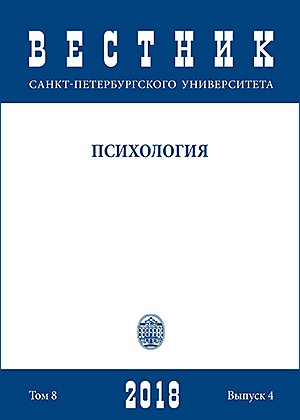Psychological content of life competence in a situation of solving the ageing problems of youth.
DOI:
https://doi.org/10.21638/11701/spbu16.2018.406Abstract
The article reveals the psychological content of life competence of young people in the context of solving age-related problems. The hypothesis of the study was the assumption that the psychological content of life competence includes cognitive (autobiographical knowledge and knowledge of age-related problems), affective (emotions and feelings in relation to the solution of age-related problems), motivational (motives, needs and aspirations associated with the solution of age-related problems) and behavioral (strategies for solving age-related problems) components. The sample consisted of data obtained from 40 people aged 23 to 26 years. The study measured the level of development of life competence, representation in its psychological content of each component. It is established that in total all selected components are interconnected and form a single structure. The cognitive and behavioural components of life competence are actualised to the greatest extent, and the affective components are actualised to the least extent when solving age-related problems. It is empirically proved that subjectively significant age-related problems defining the potential development of the personality in youth, such as search of the calling and formation of the personality as the professional activities; active intrapersonal work on the understanding of “I” and the life as unique; aspiration to the identification of reality and ideal. Life competence the most popular to solve the following age-related problems in youth: self-reliance and responsibility as personality traits; family; finding your calling; the formation of personality as a professional are the most solvable agerelated problems that characterise the actual development of personality in this period.
Keywords:
personality, life competence, developmental tasks, development, youth, content analysis
Downloads
References
Downloads
Published
How to Cite
Issue
Section
License
Articles of "Vestnik of Saint Petersburg University. Psychology" are open access distributed under the terms of the License Agreement with Saint Petersburg State University, which permits to the authors unrestricted distribution and self-archiving free of charge.





